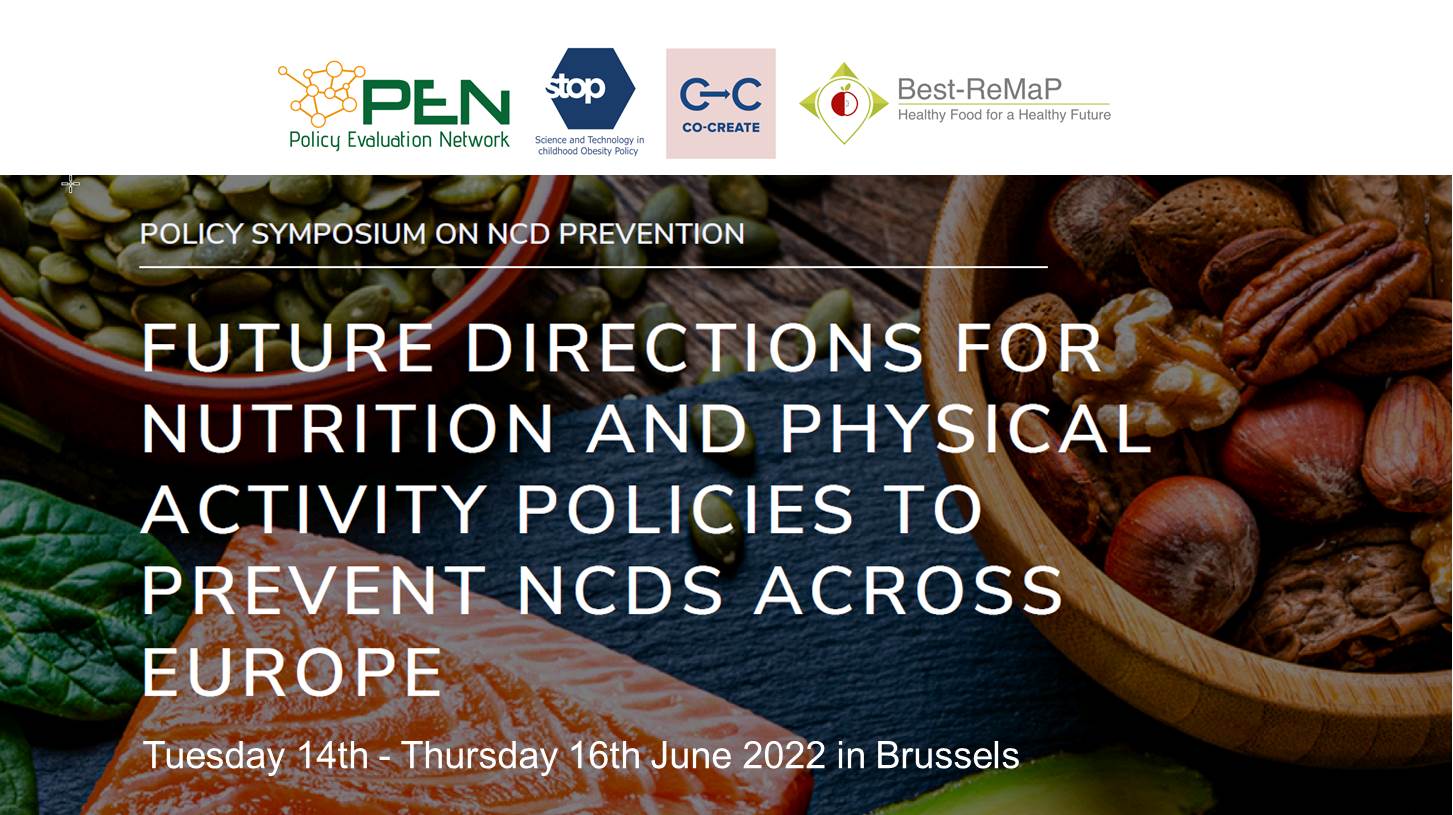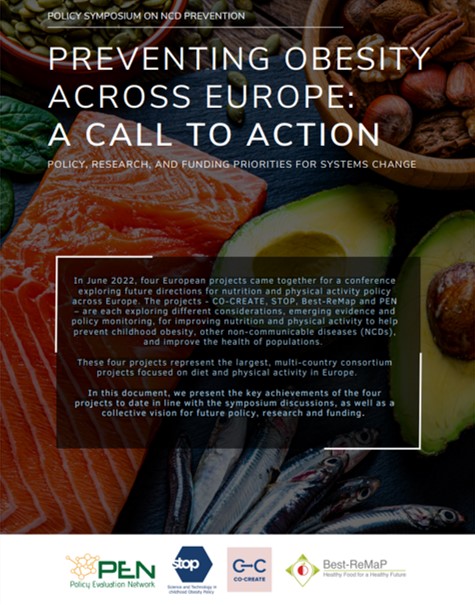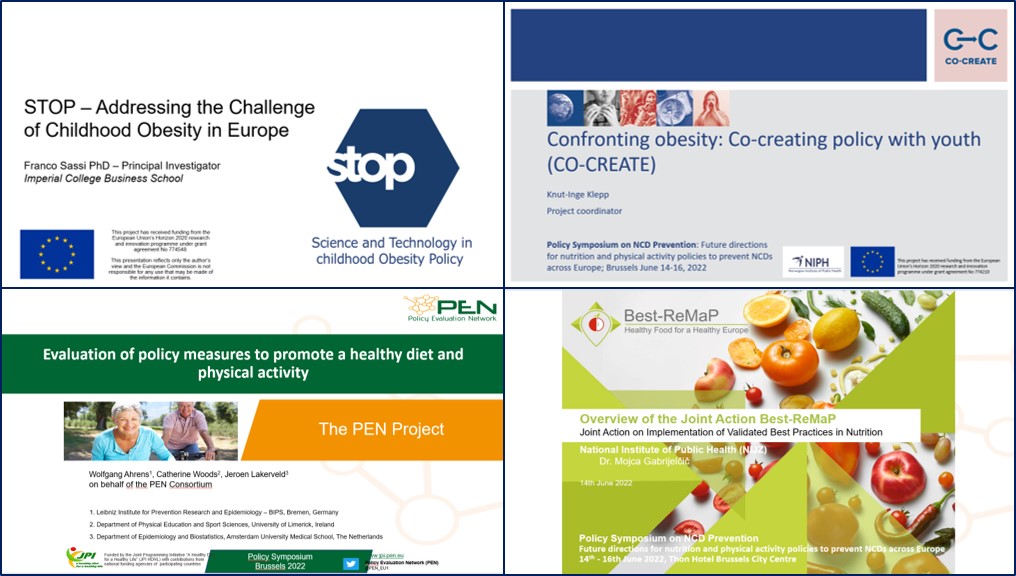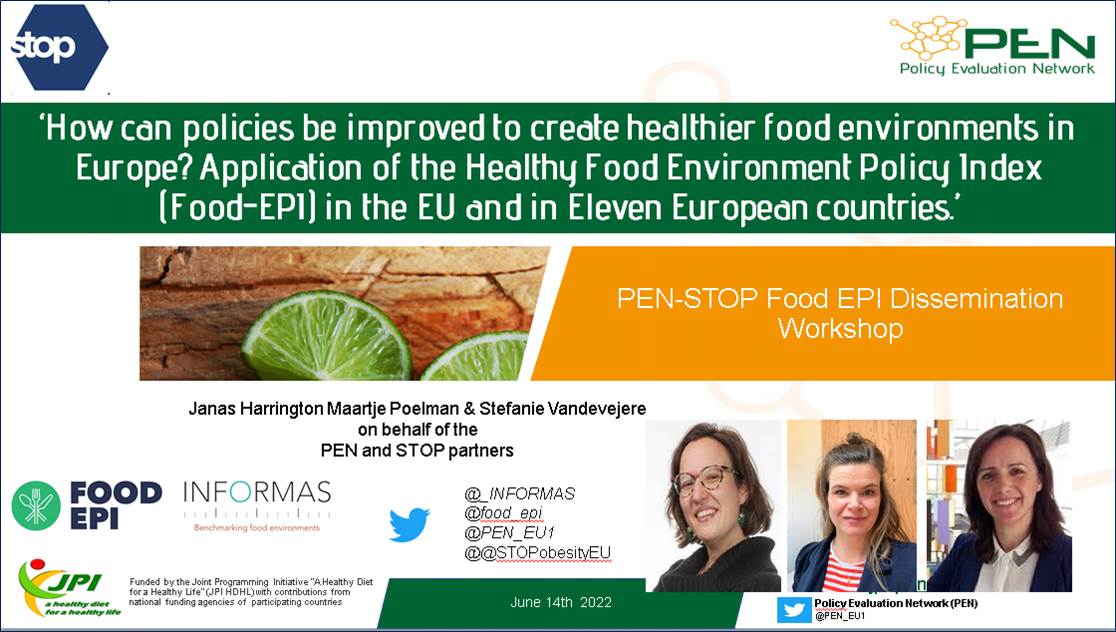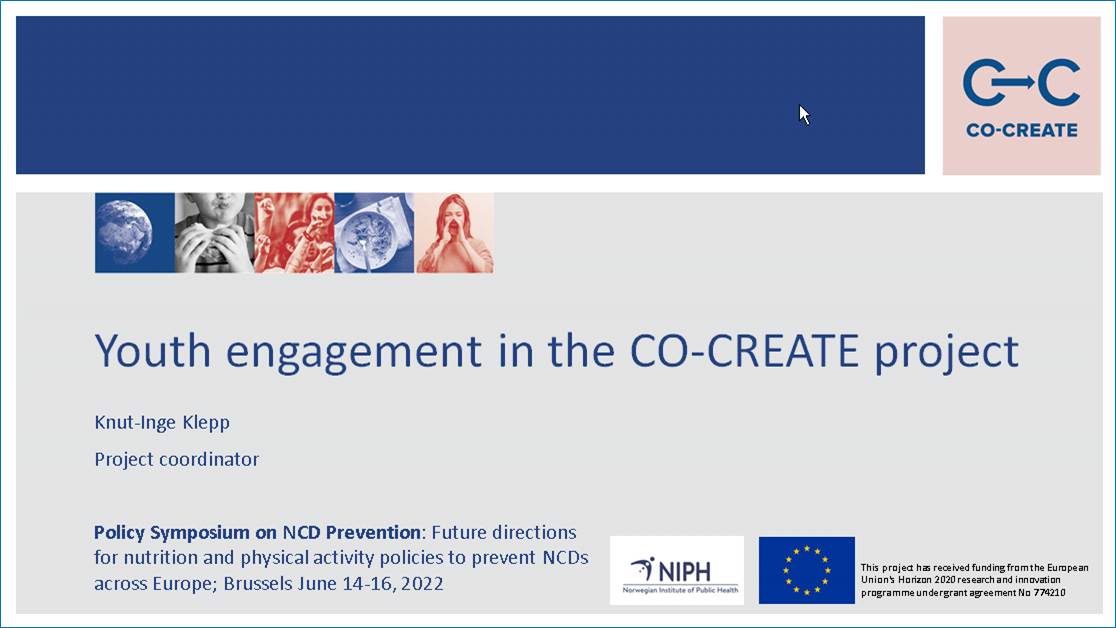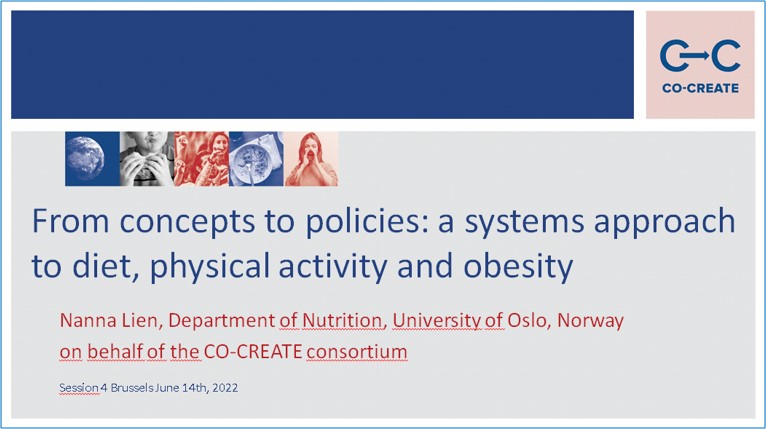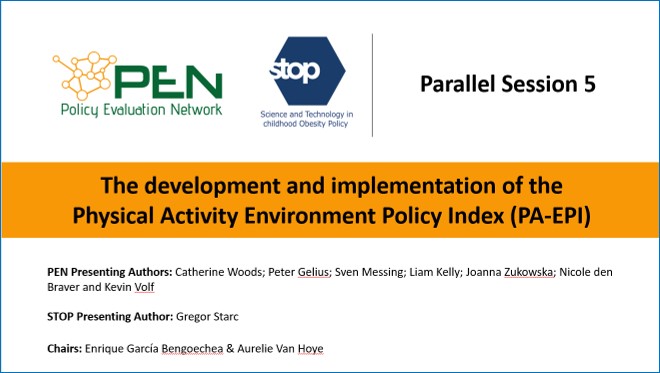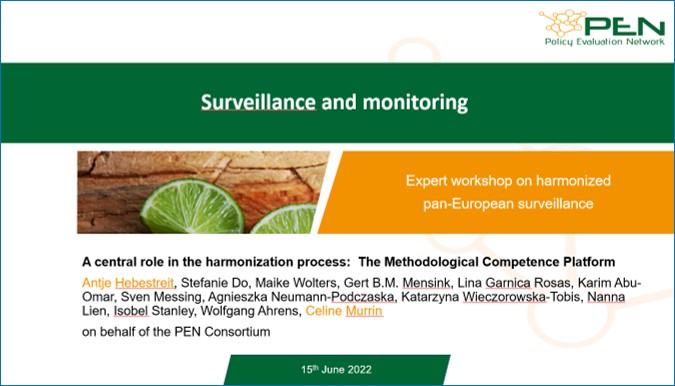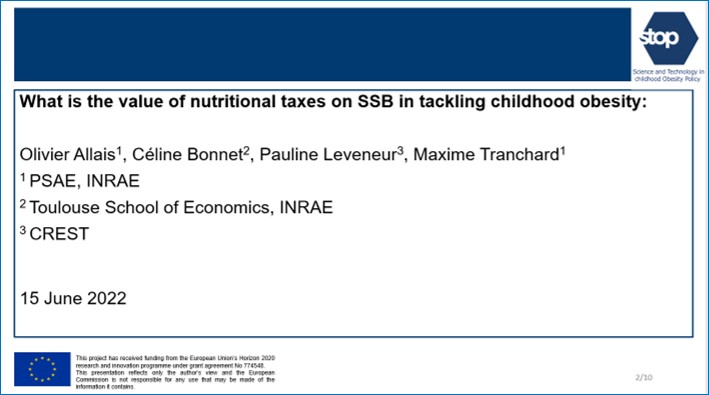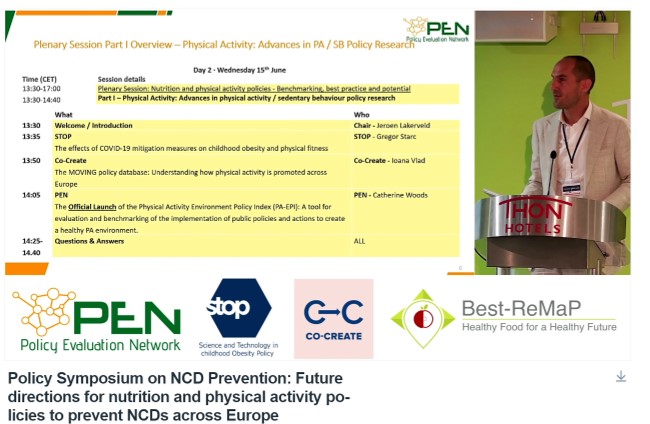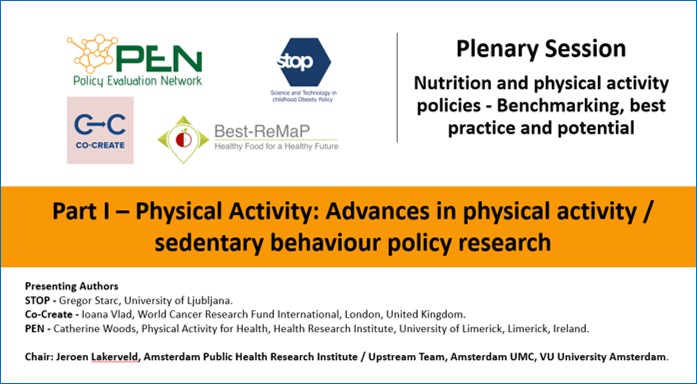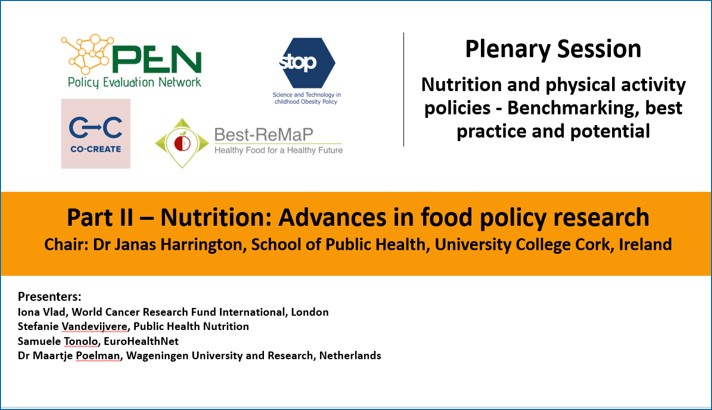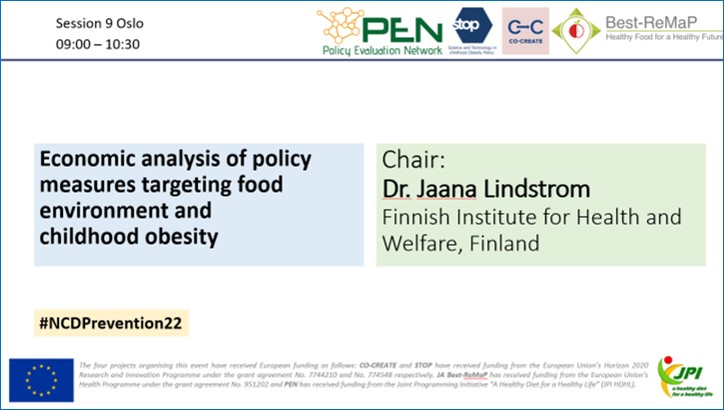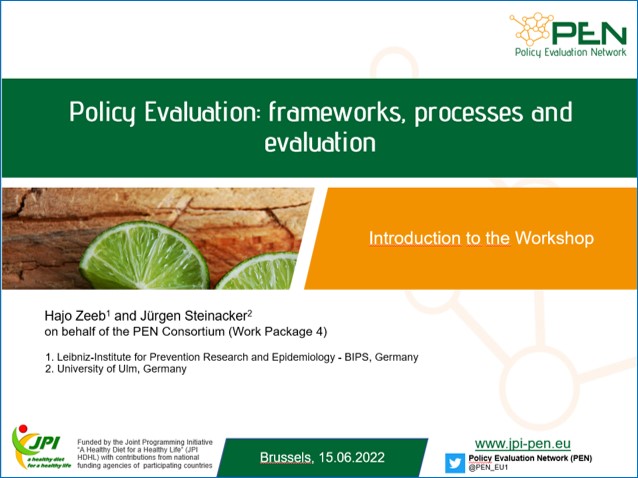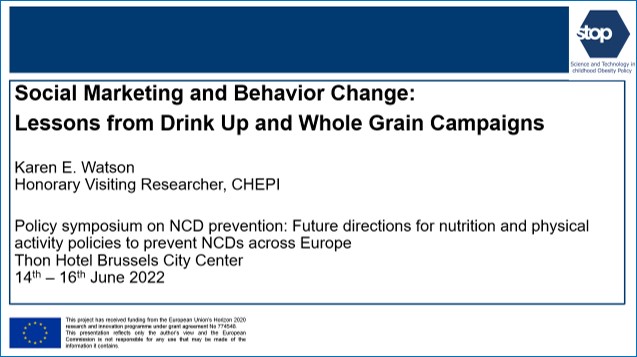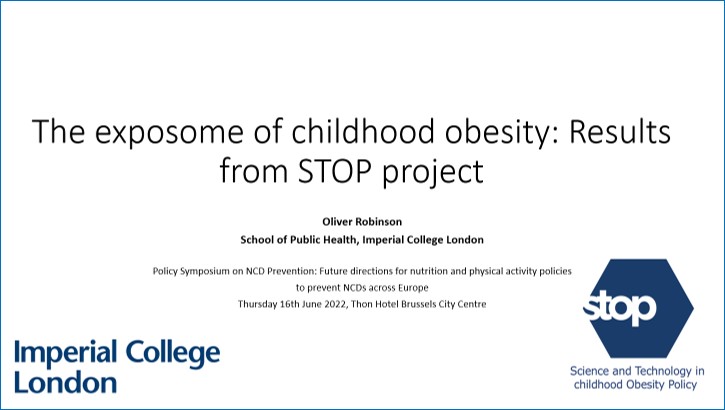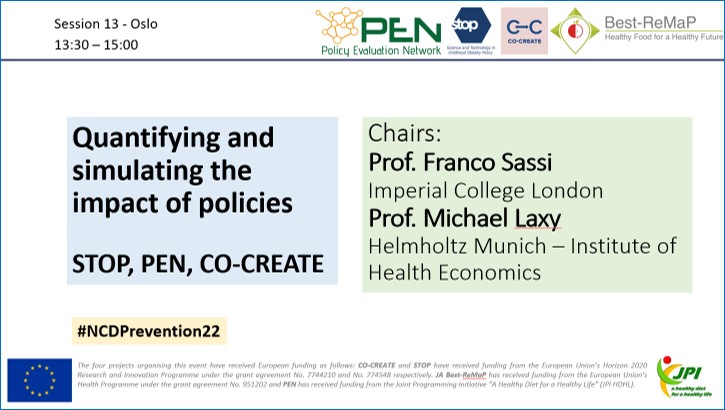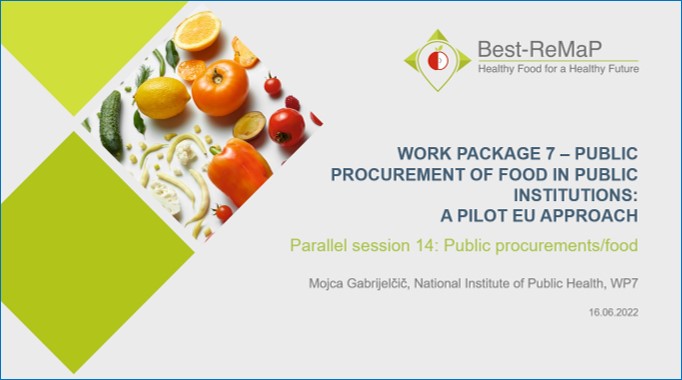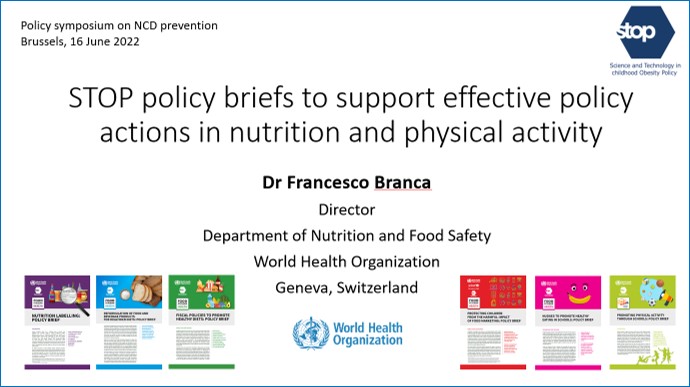#NCDPrevention22
Policy symposium on NCDs prevention
Obesity is a chronic, relapsing, multifactorial disease, and the main risk factor for several other non-communicable diseases (NCDs). The growing burden of NCDs are the leading cause of global mortality killing 41 million people each year. Successful policy actions to address physical inactivity, unhealthy diets and sedentary behaviours, key risk factors for NCDS can improve the health and wellbeing of populations and reduce premature mortality. The Joint Action (JA) Best-ReMaP, the H2020 projects CO-CREATE and STOP and the JPI-HDHL project PEN aim to contribute to understanding how to achieve successful policy implementation at different cultural, demographic, or socioeconomic levels.
With the objective to share and discuss lessons learned from these projects a symposium titled
Future directions for nutrition and physical activity policies to prevent NCDs across Europe
was held from 14th to 16th June 2022 in Brussels.
The core element of this symposium was a plenary session that took place on Wed. 15th June, which brought together policymakers and experts working in nutrition and physical activity, to present and discuss recommendations for optimal policy implementation to promote healthy diets, physical activity and to reduce sedentary behaviour across Europe.
Symposium summary:
PREVENTING OBESITY ACROSS EUROPE: A CALL TO ACTION
Policy, research and funding priorities for systems change
The key achievements of the four projects to date have been formulated in a document, in line with the symposium discussions, as well as a collective vision for future policy, research and funding.
Download this document here.
Click here to direct to the the full DELEGATE PACK (or scan the QR code!) where you will find further details on:
1. Event Overview (including venue map)
2. Agenda
4. Chair, Speaker & Panellist Biographies
6. Project Information & Funding
SESSIONS OF DAY 1 · TUESDAY 14th JUNE
OPENING PLENARY
1. Welcome and opening
Chair: Sonja Kahlmeier, Swiss Distance University of Applied Sciences (FFHS), Switzerland
2. STOP – Addressing the Challenge of Childhood Obesity in Europe
Prof. Franco Sassi, Project coordinator, Imperial College Business School, United Kingdom
Prof. Knut-Inge Klepp, Project coordinator, Norwegian Institute of Public Health, Norway
4. Evaluation of policy measures to promote a healthy diet and physical activity – The PEN project
Prof. Wolfgang Ahrens, Project coordinator, Leibniz Institute for Prevention Research and Epidemiology – BIPS, Germany
5.Overview of the Joint Action on Implementation of Validated Best Practices in Nutrition (Best-ReMaP)
Dr Mojca Gabrijelčič, Project coordinator, National Institute of Public Health (NIJZ), Slovenia
SESSION 1&3 - DISSEMINATION SYMPOSIUM: POLICY ACTION TO CREATE HEALTHY FOOD ENVIRONMENTS - PEN AND STOP HEALTHY FOOD ENVIRONMENT POLICY INDEX
Description: In PEN and STOP, we benchmarked food environment policy implementation in 11 European countries, assessed food environment policy strength in the EU and prioritized policy actions to improve food environments. After presenting the results and policy examples, an interactive workshop was organised to translate the findings into practice and aim to improve policy implementation for healthy food environments.
Dr Janas Harrington, University College Cork, Ireland
Dr Maartje Poelman, Wageningen University and Research, Netherlands
1. How can policies be improved to create healthier food environments in Europe? Application of the Healthy Food Environment Policy Index (Food-EPI) in the EU and in Eleven European countries
Dr Maartje Poelman, Wageningen University and Research, Netherlands
Dr Janas Harrington, University College Cork, Ireland
Dr Stefanie Vandevijvere, Sciensano, Belgium, Public health nutrition Epidemiology and public health
2. Strength of European level policies and priority recommendations to create healthy food environments to prevent obesity and diet-related non-communicable diseases
Sanne Djojosoeparto, Univesity of Utrecht
3. Policy implementation and priorities to create healthy food environments across 11 European countries
Dr Elisa Pineda, Imperial College London, United Kingdom
4. Introduction to World Café interactive workshop (Round 1)
Tamsin Rose, Workshop moderator, Senior Fellow for Health, Friends of Europe
5. Experiences from Spain (STOP country): Public policies for sustainable healthy diets should be addressing Spanish food marketing poli
Almudena Rollán, Agencia Española de Seguridad Alimentaria y Nutrición (AESAN) (Spanish Agency for Food Safety and Nutrition), Spain
6. Experiences from Norway (PEN country): Partnership for a healthier diet
Arnhild Haga Rimestad, Norwegian Ministry of Health and Care Services, Norway
7. World Café Round 2 – How and what can we learn from each other?
Tamsin Rose, Workshop moderator, Senior Fellow for Health, Friends of Europe
Description: The parallel session hosted by CO-CREATE discussed meaningful youth engagement in policy and what it can and should look like in practice. In addition to giving an overview of CO-CREATE project activities, priorities for childhood obesity policy in the EU was explored. CO-CREATE Youth Task Force members who have been actively engaged in the project and policy discussions at regional and national levels through Dialogue Fora over the past 3 years voiced their perspectives in the discussion.
PART 1: Meaningful engagement of youth
Dejan Bojanic, Save the Children, Sweden
1. What is meaningful engagement of youth?Prof. Knut-Inge Klepp, Norwegian Institute of Public Health (NIPH)
2. Panel: What is meaningful youth engagement and what can we learn from the CO-CREATE Project
Hanna Kristina Jakobsen, CO-CREATE Youth TaskForce
Tale Lejon, CO-CREATE Youth Task Force
Dejan Bojanic, Save the Children
Prof. Knut-Inge Klepp, Norwegian Institute of Public Health (NIPH)
PART 2: Priority policies for EU Action Plan
3. Current policy actions and interventions targeting obesity prevention among young people
Arnfinn Helleve, Norwegian Institute of Public Health (NIPH), Norway
4. Outcomes of the youth alliances, dialogues and taskforce and discussion
Dr. Evelyne Baillergeau, University of Amsterdam
Samantha Nesrallah, EAT / CO-CREATE
Pedro Goncalves, CO-CREATE Youth Task Force
Zuzanna Burzynska, CO-CREATE Youth Declaration Task Force
5. Discussion: Next steps and priorities for the EU Action Plan on Childhood Obesity
Prof. Franco Sassi, Imperial College London, United Kingdom
Mojca Gabrijelčič, Best ReMap, Slovenia,
Zuzanna Burzynska, CO-CREATE Youth Declaration Task Force
Description: Limited success to curb the obesity epidemic and to reduce social inequalities in obesity may partly result from an insufficient honouring of the complexity of these as wicked societal problems. In the CO-CREATE and PEN projects, we have addressed these problems using a systems approach. In this session we demonstrated how a systems approach can be used from conceptualizing the problem to evaluating policies, by showcasing some of the applications and experiences from our projects. Also an interactive session about how to derive at policy recommendations which are not only at the individual level took place.
Chair: Prof. Nanna Lien, University of Oslo, Norway
1. Meaningful participant engagement: Using a systems approach
Anaely Aguiar Rodriguez, University of Bergen, Norway
2. Policy evaluation: Applying a systems perspective to understand the mechanisms of the European School Fruit and Vegetable Scheme
Mahshid Zolfaghari, University of Oslo, Norway
3. Understanding the complexity of socioeconomic inequalities in dietary behaviours and physical activity: a systems approach
Prof. Frank van Lenthe, Erasmus MC Rotterdam, Netherlands
4. Deriving recommendations based on systems approaches
Prof. Frank van Lenthe, Erasmus MC Rotterdam, Netherlands
5. Interactive discussions and concluding remarks
Prof. Nanna Lien, University of Oslo, Norway
SESSIONS OF DAY 2 · WEDNESDAY 15th JUNE
SESSION 5 – THE DEVELOPMENT AND IMPLEMENTATION OF THE PHYSICAL ACTIVITY ENVIRONMENT POLICY INDEX (PA-EPI)
Description: The purpose of this session is to outline the iterative process which was undertaken to develop the PA-EPI monitoring framework and outline the next steps needed to evolve developed ‘good practice statements’ into benchmarks established by governments at the forefront of creating and implementing policies to address inactivity.
Chair: Prof. Catherine Woods, Physical Activity for Health Research Cluster, Health Research Institute, Department of Physical Education and Sport Sciences, Faculty of Education and Health Sciences, University of Limerick, Ireland
1. Using the HEPA PAT in four countries to inform the PA-EPI
Dr Peter Gelius, Friedrich-Alexander University Erlangen-Nürnberg (FAU), Germany
Dr Sven Messing, Friedrich-Alexander University Erlangen-Nürnberg (FAU), Germany
2. Systematic Literature Reviews
Dr Liam Kelly, University of Limerick, Ireland
Joanna Zukowska, Gdansk University of Technology, Poland
Nicole den Braver, Amsterdam UMC, Netherlands
3. PA-EPI Framework
Prof. Catherine Woods, Physical Activity for Health Research Cluster, Ireland
4. PA-EPI Implementation Rating & Prioritization
Kevin Volf, University of Limerick, Ireland
5. PA-EPI Next Steps
Prof. Catherine Woods, Physical Activity for Health Research Cluster, Ireland
6. The Active Lifestyle school intervention: Lessons learned
Dr Gregor Starc, Faculty of Sport, University of Ljubljana, Slovenia
Description: Together with the monitoring and surveillance systems, we aim to form the methodological competence platform, to build consensus about the mutual long-term aims for measuring health indicators in Europe, to agree on priorities and the necessary action for the harmonisation process, and on common quality standards to foster methodological advancements.
Chairs:
Dr Antje Hebestreit, Leibniz Institute for Prevention Research and Epidemiology - BIPS, Germany
Dr Celine Murrin, University College Dublin, Ireland
1. Towards a harmonised pan-European surveillance for dietary and physical activity indicators
Dr Antje Hebestreit, Leibniz Institute for Prevention Research and Epidemiology - BIPS, Germany
2. A central role in the harmonization process: The Methodological Competence Platform
Dr Antje Hebestreit, Leibniz Institute for Prevention Research and Epidemiology - BIPS, Germany
Dr Celine Murrin, University College Dublin, Ireland
3. Forming the Methodological Competence Platform
Dr Kremlin Wickramasinghe, European Office for the Prevention and Control of Noncommunicable Diseases, Nutrition Advisor, WHO EURO
4. SIMPLE: Harmonising indicators for monitoring dietary behaviour in Europe
Dr Celine Murrin, University College Dublin, Ireland
5. SIMPLE: Harmonising indicators for monitoring physical activity in Europe
Dr. Karim Abu-Omar, Friedrich-Alexander-Universität Erlangen-Nürnberg (FAU), Germany
6. EACEA project for harmonising physical activity/sport data
Michael Serneels, European Commission, DG EAC, Sport unit
7. Socio-economic position variables used in childhood obesity studies – challenges in harmonisation
Hanna Tolonen, Finnish Institute for Health and Welfare (THL), Finland
8. Panel discussion on the aims and priorities of the Methodological Competence Platform
Panellists:
Dr Kremlin Wickramasinghe, Acting Head, WHO European Office for the Prevention and Control of NCD
Dr Ivo Rakovac, WHO STEPS & COSI, Regional Advisor, WHO European Office for the Prevention and Control of NCD
Dr Katia Castetbon, WHO HBSC, Principal Investigator, Université libre de Bruxelles
Dr Sisse Fagt, NORMO, Senior Advisor, Technical University of Denmark
Panel moderator: Prof Wolfgang Ahrens, Leibniz Institute for Prevention Research and Epidemiology - BIPS, Germany
Description: This Parallel Session hosted by STOP discusse the fiscal incentives for diet improvement.
Chairs:
Prof. Franco Sassi, Imperial College London, United Kingdom
Dr. Carlijn Kamphuis, Utrecht University, Netherlands
1. What is the value of nutritional taxes on SSB in tackling childhood obesity
Dr. Olivier Allais, INRAE, France
2. Simulation of a sugar tax in the sugar-sweetened beverages market in Italy
Daniele Moro, University of Piacenza, Italy
3. Stakeholder views on an SSB tax in the Netherlands: perceived barriers and facilitators of SSB tax adoption and perceived effects for lower and higher socioeconomic groups
Sanne Djojosoeparto, Utrecht University, Netherlands
4. Manufacturers’ Reformulation Decisions Following the UK Soft Drinks Industry Levy
Prof. Franco Sassi, Imperial College London, United Kingdom
5. Taxes as an incentive for product reformulation
Dr. Olivier Allais, INRAE, France
6. Fiscal policies for diet improvement - SSB-taxes and beyond: effects of food taxation
Dr. Carlijn Kamphuis, Utrecht University, Netherlands
7. What is the value of nutritional taxes in tackling childhood obesity: Going beyond SSB – the biscuit market
Maxime Tranchard INRAE, France
MAIN PLENARY SESSION: NUTRITION AND PHYSICAL ACTIVITY POLICIES - BENCHNMARKING, BEST PRACTICE AND POTENTIAL
Did you miss the streaming live? View the recording of this session at VIMEO:
https://vimeo.com/717607642/cc28944c27
The session starts at minute 5'30''. The full session is 3.5 hours long, including a 30 min. break. The following text shows the time in the recording when each talk starts.
[00:05:30] Session start and welcome
Prof. Wolfgang Ahrens, Project coordinator, Leibniz Institute for Prevention Research and Epidemiology – BIPS, Germany, coordinator of the PEN project.
[00:07:50] PART I – PHYSICAL ACTIVITY: ADVANCES IN PHYSICAL ACTIVITY/ SEDENTARY BEHAVIOUR POLICY RESEARCH
Chair: Jeroen Lakerveld, Amsterdam Public Health Research Institute / Upstream Team, Amsterdam UMC, VU University Amsterdam, Netherlands
[00:09:50] 1. The effects of COVID-19 mitigation measures on childhood obesity and physical fitness
Gregor Starc (STOP), University of Ljubljana, Slovenia
[00:24:00] 2. The MOVING policy database: Understanding how physical activity is promoted across Europe
Ioana Vlad (CO-CREATE), World Cancer Research Fund International, London, United Kingdom
[00:35:00] 3. The PA-EPI: a tool for evaluation and benchmarking of the implementation of public policies to create a healthy physical activity environment
Catherine B. Woods (PEN); University of Limerick, Limerick, Ireland
[00:59:20] Q&A of part I
[01:06:30] PART II - NUTRTION: ADVANCES IN FOOD POLICY RESEARCH
SLIDES AVAILABLE SOON
Chair: Dr Janas Harrington School of Public Health, University College Cork, Ireland
[01:09:00] 1. The NOURISHING database: exploring diet related policies implemented across Europe
Iona Vlad, World Cancer Research Fund International, London, United Kingdom
[01:18:00] 2. Business Impact Assessment on Obesity and Population Nutrition (BIA-Obesity) at EU and national levels
Iris Van Dam (STOP), Sciensano, Belgium
[02:00:20] 3. Policy challenges and opportunities: Ensuring sustainability of Best-ReMaP results by implementing a food system sustainability indicator into the EU policy frameworks
Samuele Tonolo (Best-ReMaP), EuroHealthNet
[02:10:15] 4. Priority recommendations to create healthy food environments in Europe: Next Steps
Dr Maartje Poelman (PEN), Associate Professor chair group Consumption and Healthy Lifestyles, Wageningen University & Research, Netherlands
[02:26:00] Q&A of part II
[02:41:30] Panel Discussion (no slides presented)
Chair: Caroline Costongs, EuroHealthNet
Panellists:
Dr Francesco Branca Director, Department of Nutrition for Health & Development, WHO
Dr Sirpa Sarlio Adviser, Finnish Ministry Social Affairs/Health & Helsinki University, Finland
Dr Roxane Berjaoui, Dept European/International Affairs, DG Health, Ministry of Solidarity & Health, France
SESSIONS OF DAY 3 · THURSDAY 16th JUNE
SESSION 9 – ECONOMIC ANALYSIS OF POLICY MEASURES TARGETING FOOD ENVIRONMENT AND CHILDHOOD OBESITY (Best-ReMaP and STOP)
Description: Introduction in the economic modelling of obesity policies and link to the evaluation practices and EU Best practice database; presentation of the approaches in providing evidence for modelling three specific Best-ReMaP policies; use of economic arguments in advocating for specific economic measures.
Chair: Jaana Lindstrom, Finnish Institute for Health and Welfare, Finland
Michele Cecchini, OECD
2. Food composition data at branded level: methodology of collection and added value for the assessment of nutrition policies
Karine Vin, ANSES, France (Best-ReMaP WP5)
3. Economic analysis of different policy scenarios on food marketing restrictions: statutory, voluntary and co-regulation
Maria Joao Gregorio, Directorate-General of Health of Portugal (Best-ReMaP WP6)
4. Economic evaluation of the Best-ReMaP emerging practice - Public procurement of food in public institutions
Mojca Gabrijelčič and Lea Raztresen, National Institute of Public Health Slovenia (Best-ReMaP WP7)
5. Results from the STOP policy scenarios: Marketing regulation
Alijadallah Belabess, Imperial College London
6. Panel: Costs of obesity policies vs savings on human health
Chair: Albert Aszalos, Best-ReMaP
Panellists:
Michele Cecchini, OECD
Franco Sassi, Imperial College London
Alijadallah Belabess, STOP
Mojca Gabrijelčič, Best-ReMaP WP7
Karin Vin, Best-ReMaP, WP5
Maria Joao Gregorio, Best-ReMaP, WP6
Sirpa Sarlio, Finnish, MoH; Wim Debeuckelaere, DG Sante
DOWNLOAD SLIDES HERE
Description: This session organized by PEN gave insights into the choice of policy implementation frameworks and how policy implementation differs from other implementation processes. Detailed studies on factors influencing successful implementation of NCD prevention policies were presented, together with recommendations on implementation evaluation.
Chairs:
Prof Hajo Zeeb, Leibniz Institute for Prevention Research and Epidemiology-BIPS, Bremen, Germany
Prof. Jürgen M. Steinacker, University of Ulm, Ulm, Germany
Anna Banik, SWPS University of Social Sciences and Humanities, Wroclaw, Poland
2. Determinants of the adoption of physical activity policies in primary schools from the perspective of headmasters - A cross-sectional study in south-west Germany
Janine Wendt, University of Ulm, Ulm, Germany
3. Much in common and yet different: intervention and public policy implementation evaluation - Results from the PEN Project using the example of physical activity and nutrition
Dr. Sarah Forberger, Leibniz Institute for Prevention Research and Epidemiology - BIPS, Bremen, Germany
4. Good practice recommendations on Policy Implementation Evaluation for policies targeting diet, physical activity and sedentary behaviour
Dr. Annabel Müller-Stierlin, University of Ulm, Ulm, Germany
Janine Wendt, University of Ulm, Ulm, Germany
DOWNLOAD SLIDES HERE
Description: One could envision a Europe where only those foods that contribute to healthy, sustainable diets are being promoted. A Europe where people, and youth especially, are not constantly exposed to the manipulative marketing of foods associated with harm to people’s and planetary health. This session explored two angles of such a possible vision. How and under which conditions can social marketing be used to promote better diets? And, what marketing regulations are needed to minimise the exposure to unhealthy food marketing, which is so widespread today?
Chairs:
Nikolai Pushkarev, European Public Health Alliance (EPHA)
Dr Mojca Gabrijelčič, Slovenian National Institut of Public Health (NIJZ)
1. Social Marketing and Behavior Change: lessons from Drink Up and Whole Grains Campaigns
Karen Watson, Honorary Visiting Researcher, CHEPI
2. Examining innovative advertising techniques food companies use to target youth on social media
Dr. Marie Bragg, Department of Population Health, NYU School of Medicine
3. Exploring the equity implications and acceptability of marketing policies
Margot Neveux, World Obesity Federation –
4. Best practices in reducing marketing of unhealthy food to children and adolescents
Maria João Gregório and Margarida Bica, Directorate-General of Health of Portugal
Dr Mimi Tatlow-Golden and Dr Magdalena Muc, The Open University
Description: In this session, co-organized by the STOP project and Joint Action BestReMap, the gap between the scientific evidence and the public health policies in nutrition were discussed. The speakers described the potential transfer of the results of the STOP WP3 on the metabolomic signature of the consumption of ultra-processed foods, into EU and national policies.
Chair: Oliver Robinson, Imperial College London
Oliver Robinson, Imperial College London (STOP)
2. The epigenetic signatures of rapid weight growth
Michelle Plusquin, Hasselt University (STOP)
3. How to fill the gap between the evidence the childhood obesity and the public health policies
Dr. Marco Silano, Instituto superiore Di Sanita, Italian Intitute of Health (Best-ReMaP WP4)
Description: The session covered different strategies to quantify the impact of nutrition and health policies. Different perspectives were considered, ranging from the identification of causal effects with experimental and observational data, to the simulation of outcomes considering the complexity of the underlying mechanisms. The aim was to explore potential synergies and complementarities which could bring stronger evidence.
Chairs:
Prof. Franco Sassi, Imperial College London, United Kingdom
Prof. Michael Laxy, Helmholtz Munich – Institute of Health Economics, Germany
1. Policy evaluation using a multi-dimensional risk factors and diseases framework: a microsimulation approach
Alijadallah Belabess, Imperial College London (STOP)
2. Developing an integrated microsimulation model for the impact of fiscal policies on child health in Europe: the example of childhood obesity in Italy
Prof. Davide Rasella, Barcelona Institute of Global Health, ISGlobal
3. Observing purchasing behaviours: laboratory vs. Supermarkets
Laurent Muller, INRAE (PEN)
4. Perspectives and challenges in the application of quasi-experimental methods and synergies with simulation models
Mario Mazzocchi, University of Bologna (PEN)
5. The system dynamics modelling approach to policy evaluation
Eduard Romanenko, University of Oslo, Public Health in Nutrition Group (CO-CREATE)
Chair: Dr. Mojca Gabrijelčič, Slovenian National Institut of Public Health (NIJZ)
1. Public food procurements in JA Best-ReMaP
Mojca Gabrijelčič, NIJZ (Best-ReMaP)
2. Public food procurement for sustainable food environments
Nikolai Pushkarev, EPHA
3. Legislative initiative on a framework for a Union sustainable food system
Wim Debeuckelaere, DG SANTE, Unit D1: Farm to Fork Strategy
4. Presentation of Catalogue for public procurement of food
Barbara Lončarek, CCIS
5. Round table on experiences and impact so far from Best-ReMaP WP7 partners
WP7 partners from 6 Member States:
Mojca Gabrijelčič, NIJZ, Slovenia
Judith Benedics, BMASGK, Austria
Betina Bergmann Madsen, CPH-MUN, Denmark
Tiina Sirkjärvi, THL, Finland
Eleftheria Papachristou, ICH, Greece
Katarzyna Brukało, SUM, Poland
DOWNLOAD SLIDE HERE
1. STOP policy briefs to support effective policy actions in nutrition and physical activity
Dr Francesco Branca, Director of Department of Nutrition and Food Safety, World Health Organization, Geneva, Switzerland
2. Symposium final statement: Recommendations and future directions for nutrition and physical activity policies in Europe
Dr. Hannah Brinsden, World Obesity Federation, United Kingdome,
on behalf of PEN, STOP, CO-CREATE, Best-ReMaP


